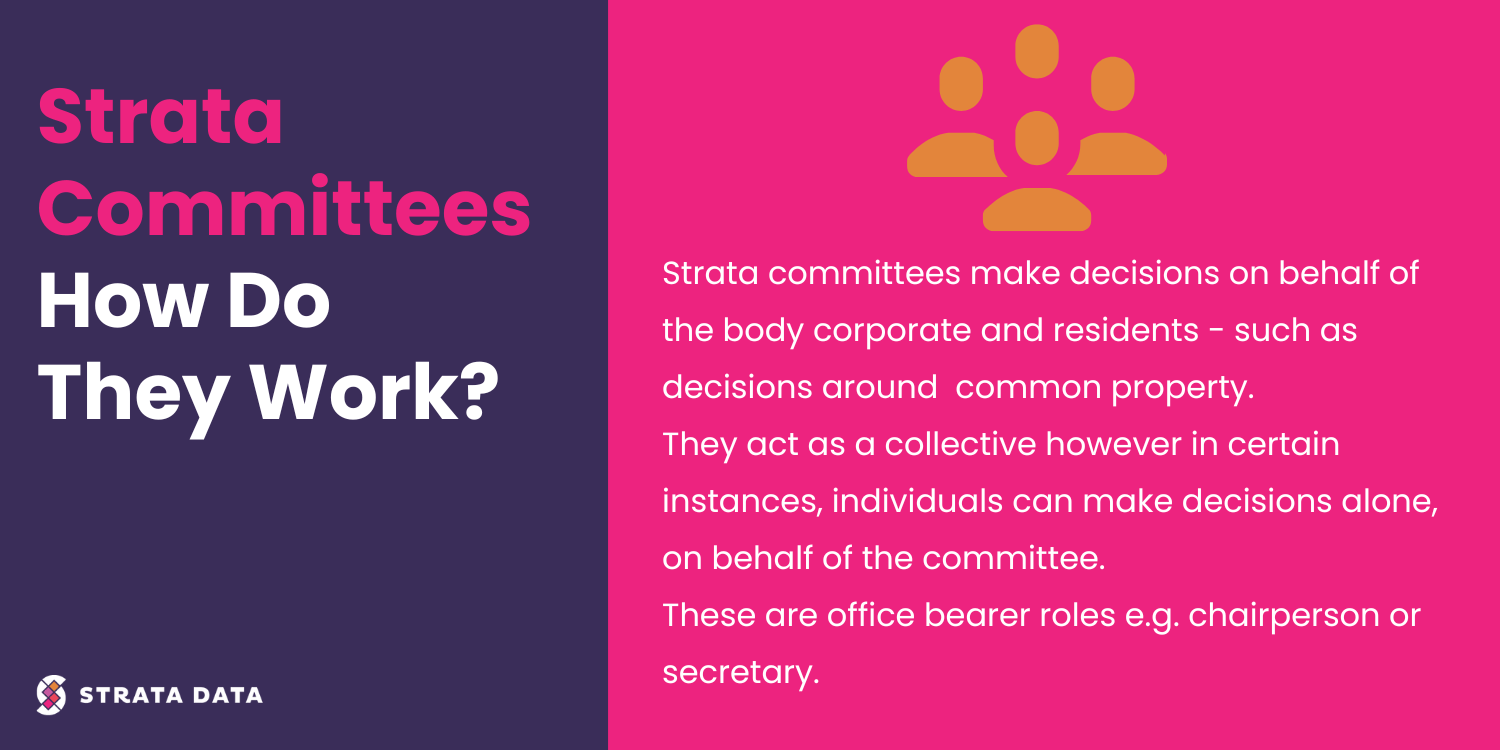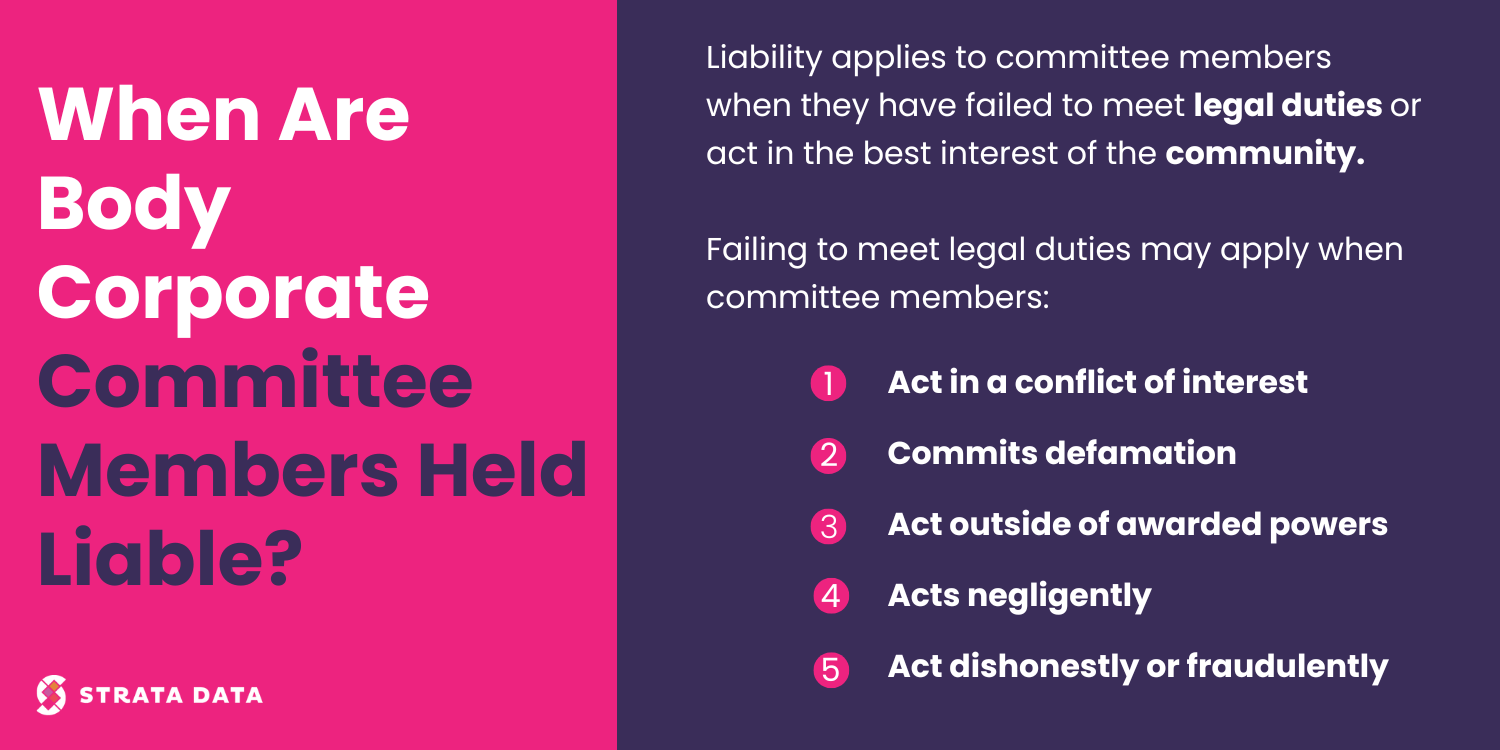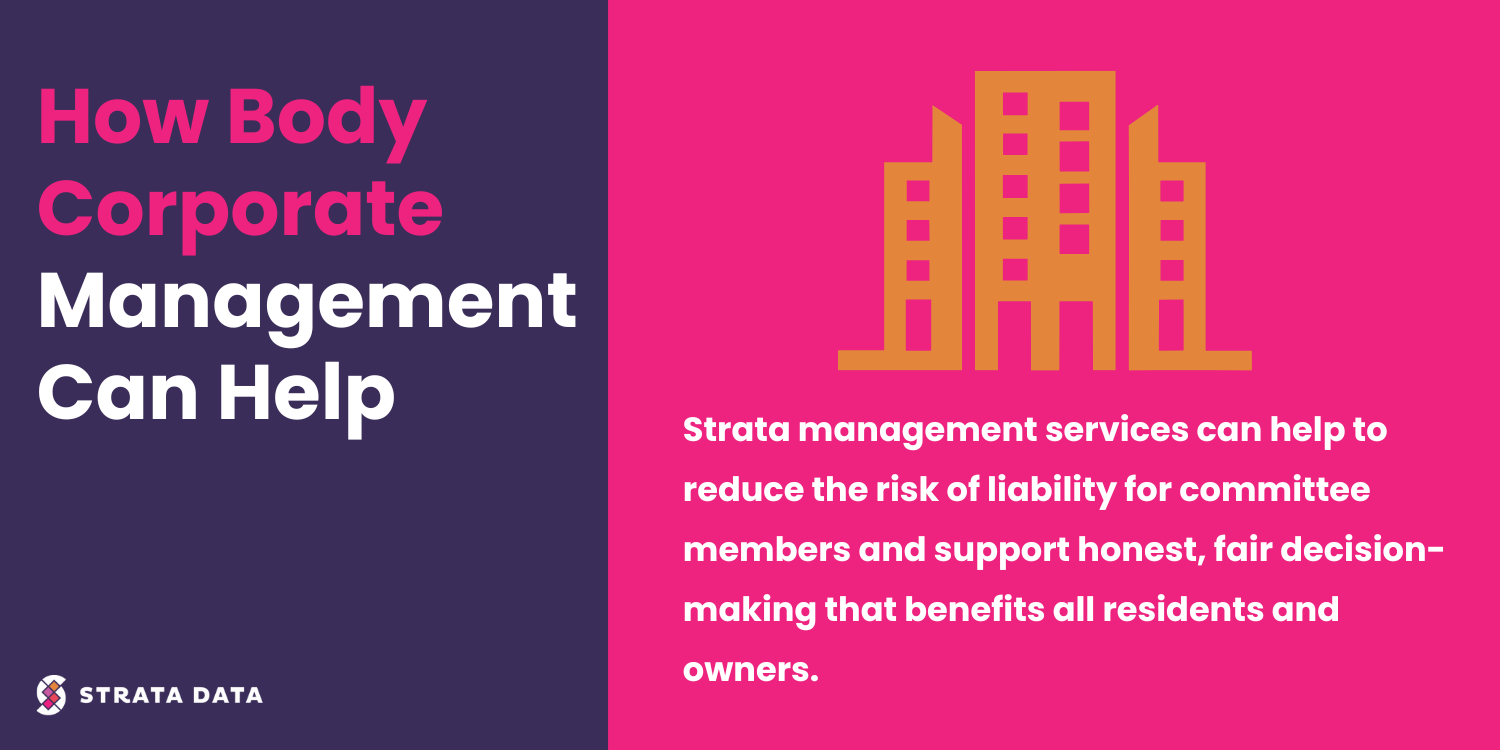Are Body Corporate Committee Members Liable?

Body corporate committee members make decisions on finances, bylaws, and the use of common property. This responsibility means that body corporate committee members can be held liable for decisions and outcomes that conflict with their legal responsibility. However, there are also legal protections that indemnify a body corporate committee member against personal liability.
This guide offers a clear overview of the liabilities and protections that apply to body corporate committee members.
How Strata Committees Work
Strata committee members can make decisions on behalf of the body corporate and residents – these include decisions on how the strata’s finances are used, making and enforcing bylaws, and ensuring the proper use and maintenance of common property.
Committee members act collectively, meaning that no individual committee member can make a decision on behalf of the entire committee without a discussion through a meeting or vote. However, there are instances where a committee member can perform tasks on behalf of the committee in the capacity of an individual office bearer role, such as chairperson, secretary, or treasurer.
These office bearer roles can involve signing contracts, authorising urgent payments, or communicating with owners based on the decisions made by the committee.

When Are Body Corporate Committee Members Held Liable?
Liability applies to committee members when they have failed to meet legal duties or act in the best interest of the community. The latter claim is usually less clear-cut – since the ‘best interests’ of the corporation is usually subjective, a committee member can avoid being held liable if there was a reasonably-held basis for their actions or decision.
Failing to meet legal duties may apply when committee members:
- Act in a conflict of interest – A body corporate committee member who favours certain owners or makes decisions for personal gain.
- Commits defamation – Publishing a false statement that harms an owner’s reputation, even if unintentional.
- Act outside of awarded powers – Making decisions that are beyond the legal authority granted by bylaws and the Strata or Community Titles Act
- Acts negligently – Failing to comply with legal duties, resulting in damage to the property, penalties for the strata corporation, or poor budgeting.
- Act dishonestly or fraudulently – Intentional criminal acts, such as the misuse of funds.
In such situations, the owners’ corporation can file a legal claim for damages against the offending strata committee members. Circumstances where individual owners are directly impacted by the actions of a strata committee member are also grounds for legal claims.

Protections for Committee Members
Body corporate committee members usually serve on a voluntary basis, and are covered by certain legal protections to minimise liability for individual committee members.
Immunity of liability for committee members
S 99(1) of the Community Titles Act 1996 and s47 of the Strata Titles Act 1988 states that an individual cannot be held personally liable for an act or omission while acting in their role as a committee member, if the committee member had acted honestly and reasonably. Instead, the body corporate will be held liable for the costs of the outcome.
Cases involving dishonesty or negligence can still result in the committee member being held personally liable for the damages.
Office Bearers insurance
Body corporate committees should ensure their body corporate holds Office Bearers insurance to cover individual committee members who perform regular committee duties. Office Bearers insurance may protect against claims made by owners or residents who view actions or decisions made as unfair. Officeholder insurance may not cover defamation claims (commonly seen in cases of strata bullying).
Taking Action Against A Liable Body Corporate Committee Member
Owners and the body corporate committee can take legal action against a committee member if they believe that the member has acted dishonestly or negligently.
There is an escalation protocol when dealing with a liable body corporate committee member:
- Internal committee discussion – The strata committee can arrange a meeting to discuss the actions of the committee member and allow them to explain or rectify the situation. Mediation services may be used to resolve conflicts between the offending committee member and the affected party.
- Removal from the committee – The member can be removed from the committee by ordinary resolution (vote) of the body corporate on the grounds of misconduct, or neglect of duty, or incapacity or failure to satisfactorily carry out the duties of the office.
- Legal action – If the damages are significant and not resolved through internal mediation, owners and the body corporate committee can file a legal claim with the South Australian Magistrates Court. Making a civil claim against an individual committee member requires substantial evidence of the breach of duty and the resulting losses.
The maximum legal penalty for dishonest or fraudulent actions is $15,000, or four years imprisonment. A committee member who has abused their official position to gain a personal advantage for themselves or others will also face a maximum penalty of $15,000 or four years imprisonment.
Committee members who have a financial interest or stake in a decision to be made by the committee must make it known to the committee and abstain from any discussions or votes. Failing to do so may incur a maximum penalty of $15,000.
How Body Corporate Management Can Help
Engaging professional body corporate management can significantly reduce the risk of liability for committee members and support honest, fair decision-making that benefits all residents and owners.
Strata Data provides comprehensive strata management services across South Australia, covering dispute resolution services for committee members, owners, and tenants. With over 45 years of experience managing strata corporations, we have the expertise to help body corporate committees navigate the complexities of strata management and gain the confidence to act in the interests of the community.




